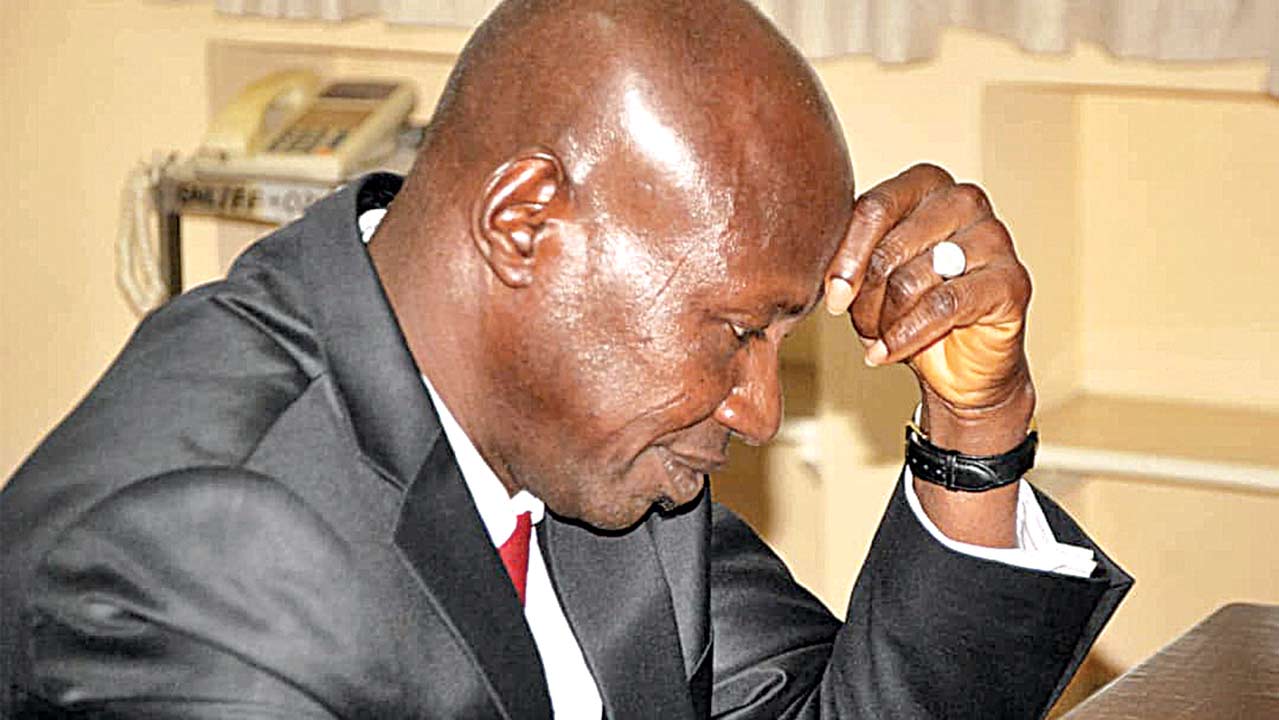The Ibrahim Magu story is one that many Nigerians heard, sighed and muttered, it’s normal, we have heard it before.
The story is that the apparently incorruptible, fearless over-achieving head of the EFCC has been caught with his hands in the till. The story is spicy, Ibrahim Magu who had been locking up the corrupt criminals for five years had himself been looting the looted property he had recovered from the looters. The anti-crime czar was accused of living above his means, fraternising with corrupt persons and diverting recovered funds. As if that was not bad enough, he is also accused of insubordination to the Office of the Minister of Justice and Attorney-General of the Federation, Mr. Malami. Do not forget that it was the failure of the Office of the Attorney General to successfully prosecute corrupt officials over the years that led to the establishment of the EFCC as an independent prosecutorial organ.
Two things strike me about the on-going investigations on the Magu affair. First, there has been no official information about the allegations against him even after his lawyer demanded repeatedly that the Salami Investigating Panel should tell Magu what he is being accused of. Secondly, there has been a massive number of leaks purporting to show the crimes Magu is supposed to have committed. It is important to remember that the origin of the Magu Affair was a memo from the Attorney-General direct to President Buhari seeking the removal of Ibrahim Magu from the EFCC and providing three names from which the president should choose a replacement. As the memo hit the President’s desk, it was leaked to all Nigerians. Rather than do as he was told, the president decided to investigate the matter.
I have complained repeatedly that when the Department of State Service (DSS) sent a memo to the Senate, five years ago, complaining that Mr. Magu was corrupt and unfit for office, the matter should have been investigated at that time and a decision taken. I do not understand why his issues were left to “mature” for five years before investigations were commenced. It is good that the investigation is finally on-going and hopefully, the panel would provide the government and Nigerians a clearer picture of the Magu affair. As I said in this column last week, the logic of such high-level investigations and intrigues is that it leads to more revelations as eyes and energies are focused on the matter. Following the wedding of the son of the minister of justice in Kano a few days ago, a series of allegations turned to him. He was painted as someone with vast unexplained wealth, which was displayed during the wedding.
The Magu communication machine has also been active and they are presenting another narrative on the suspended acting chairman of the EFCC. The Commission, they say, has secured about 2,448 convictions from 2015 when he became its boss till date. The numbers are impressive in terms of successful prosecutions: 2015- 103, 2016- 109, 2017- 189, 2018- 315, 2019- 1281, 2020- 369 as at June giving us a total of 2,448 successful prosecutions. This means no one in the history of Nigeria has sent as many corrupt criminals to jail as Magu has. It is instructive to note that some of the convictions include ex-governors, top military officers, captains of industries, and other politically-exposed persons. Two ex- governors of the ruling All Progressives Congress (APC) party: Jolly Nyame (Taraba State) and Joshua Dariye (Plateau State) are serving their different jail terms in Kuje Prison, Abuja. The commission also secured the conviction of former Abia State Governor, Orji Uzo Kalu, until the Supreme Court recently set aside his conviction on technical grounds and ordered the retrial of the ex-governor. Former National Publicity Secretary of the Peoples Democratic Party (PDP), Olisa Metuh is also cooling his heels in prison, following his conviction over N400 million money laundering. A senior lawyer, Dr. Paul Nwobike (SAN), was convicted for perverting the course of justice while the Legal Practitioners Privileges Committee (LPPC) withdrew the coveted Senior Advocate of Nigeria from him. Vast amounts of monies have also been recovered from the criminals and what happened to some of the money is what is in contention today.
It was the former Chairman of the EFCC, Mallam Lawal Ribadu who explained to Nigerians that when you fight corruption, it fights back so it is worth posing the question whether the fight-back is on. Magu’s lawyer, Wahab Shitu has been active suggesting that there is a frame up of his client but I guess that is his job and it is the Salami investigation and the prosecution that might follow that will lead us to the truth.
There are numerous reports that the conflict between Abubakar Malami and Ibrahim Magu may lie in their different visions over discontinuation of prosecution of corrupt persons. In February 2018, Premium Times broke the story about Attorney-General, Abubakar Malami, writing President Buhari, urging him to allow a stop to his administration’s legal battles against the principal actors in the controversial Malabu Oil deal saga. It would be recalled that the scandal over the OPL 245 oil block began in 2011 when the Goodluck Jonathan administration approved its purchase by Shell and Agip-Eni from Malabu Oil and Gas Ltd., a suspected briefcase firm with ties to Dan Etete, a convicted criminal who was Nigeria’s petroleum minister from 1995 to 1998. The Jonathan administration officials who participated in the negotiation preceding the controversial sale of the massive oil block included Mohammed Bello Adoke, Attorney-General at the time; and Diezani Alison-Madueke, who was petroleum minister. It appears that Magu had been very keen on prosecuting them and Malami had been opposed to it. The case itself is too complicated for me to understand but there have been many other cases in which Malami has used his prerogative as Attorney-General to enter the famous decision to let go and not prosecute, nolle prosequi. I wonder why?
Earlier this week, one of the prosecutors with the Special Presidential Investigation Panel, (SPIP), for Recovery of Public Property, Oluwatosin Ojaomo, was said to have accused the Attorney-General of the Federation, Abubakar Malami, of withholding approval for the prosecution of hundreds of assets forfeiture and other criminal cases. The president had in September 2019, dissolved the Obono-Obla led SPIP, while directing the AGF to immediately take over all outstanding investigations and other activities of the SPIP. In November 2019, over 500 case files were retrieved from the office of the disbanded Panel, and an 8-man panel was set up by the Department of Public Prosecutions, DPP, in the ministry of justice, to review the heaps of files. Meanwhile, according to the prosecutor, Malami has failed to file the cases in court, in violation of the Presidential directive, and Section 1 of the Administration of Criminal Justice Act, ACJA, 2015. What is clear is that there is a complex web of on-going activities related to investigating and prosecuting corruption cases and a clear attempt to change the direction of travel in this regard. Let us hope that the Salami Panel of Investigation brings clarity and a sense of direction in the very tough battle against corruption which has the power to fight back.

 Join Daily Trust WhatsApp Community For Quick Access To News and Happenings Around You.
Join Daily Trust WhatsApp Community For Quick Access To News and Happenings Around You.

